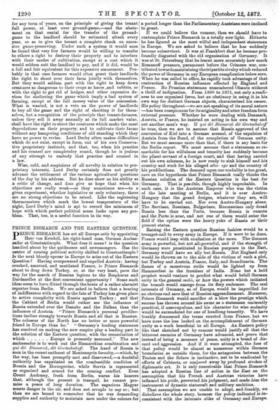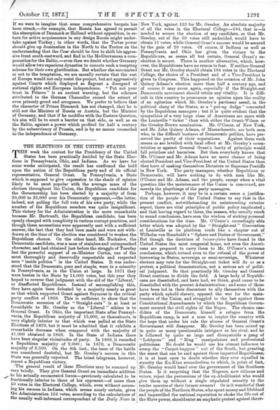PRINCE BISMARCK AND THE EASTERN QUESTION.
PRINCE BISMARCK has set all Europe astir by appointing Herr von Keiidell, his right-hand man, German Ambas- sador at Constantinople. What does it mean? is the question bandied about by• the quidnunce and -newamongers. Has the centre of coming political activity shifted to Constantinople ? Is the next bloody uproar in Europe to arise out of the Eastern Question ? -Having overpowered and expelled Austria; having crushed, amerced, and mutilated France, is Prince Blamer& about to drag down Turkey, or, at the very least, pave the way for the march of Russian legions to the Bosphorus and Dardanelles at the .first convenient opportunity ? Some suoh ideas seem to have flitted through the-brain of a rather alarmist reporter from Bathe. We are asked to believe that a bearing of indifference with -regard to the fate of Tarkey_has given place to aotive complicity with Russia against Turkey ; and that the Cabinet of Berlin would rather see the influence of -Russia extended over the Danube and the Balkan than the influence of Austria. "Prince Bismarck's personal _predilec- tions incline strongly towards Russia and all that is Russian. The colossus of the North has no better or more powerful friend in Europe than he." " Germany's leading statesman has resolved on making the -new empire play a leading part in the solution of the Eastern question, with the resuscitation of which . . . . . . Europe is presently menaced." The new ambassador is to work out the Bismarckian combination and gui dit Bismarck, ditGortschakoff. The hand of Russia is seen in the -recent outburst of Montenegrin ferocity,—which, by the way, has bean promptly met and disavowed,—a doubtful authority has expatiated on the combustible condition of Bosnia and the ,Herzegovine, while Berrie is represented as organised and armed -for the coming conflict. Even -Count Andrassy, fresh from Berlin, warns his hearers that, although the present is tranquil, he cannot pro- mise a peace of long duration. The sagacious Magyar scents danger in the air, and does not scruple to say so ; but then we are bound to remember that he was demanding -supplies and authority to maintain men under the colours for a period longer than the Parliamentary Austrians were inclined to grant.
If we could believe the rumour, then we should -have to contemplate Prince Bismarck in a totally new light. Hitherto he has figured as the most wilful and independent statesman in Europe. We are asked to believe that he has suddenly become subservient. It was at ErAnkfort that he became pro- foundly disgusted with the old organisation of Germany. It was at St. Petersburg that he learnt more accurately how much Romsooff pressure, !paramount before the Crimean war, con- tributed towards maintaining thetripartite rivalry which reduced the power of Germany in any European complication belowzero. When he was called to office,.he rapidly took advantage of that contraction of Russian influence -effected by !England and France. No Prussian statesman remembered -01runtz without a thrill ofindignation. From 1860 to 1871, not only a readi- ness to use organised farce, hut an -obstinacy in using it in his own -way for distinct German objects, characterised his career. His policy throughout—we are not speaking of its moral nature —has been conspicuous for its originality and utter freedom from external pressure. Whether he were dealing with Denmark, _Austria, or France, he insisted on acting in his own way and not another man's way. If gui dit Bismarck dit Gortschal.off be true, then we Are to _assume -that Russia approved of the conversion of Kiel into a German .arsenal, of -the expulsion of Austria from the Band, of the completion of German unity. But we -must assume more than that, if there is any basis for the Berlin report. We must assume that a statesman so se- -raarkable for his wilfulness and tenacity.has suddenly become the pliant servant of A foreign court, and that having carried out his own schemes, he is now ready to sink -himself and his country and work for his alleged alter ego and the-country of his predilections. The demand upon our credulity is too great, save on the hypothesis that Prince Bismarck really -thinks the Russian solution .of the Eastern Question is the best for Germany. That is possible, though highly improbable. In such case, it is the Austrian Emperor who was the victim of the late meeting at Berlin, and it is over Austro- Hungary that the grand designs, whatever they are, will have to be carried out. Nor even Austro-Hungary alone. The .Servians, Bosnians, Bulgarians, Roumanians only dread Russia less than the Porte, -because Russia is .remote and the _Porte is near, and not one of them would enter the field if the option were the heavy yoke of Russia or their present status. Raising the Eastern question Russian fashion would be a trumpet-call-to every army in Europe. If it were to be done, France would leap-with exultation at the news. The German _army is powerful, but not all-powerful, and if the strength of -Germany were prostituted to Russian purposes in the East, Germany would have no ally but _Russia. Not England only would le thrown-on to the _side of the -victims of such a plot, -but Turkey and Austria, France, Italy, and Scandinavia. The -flames of a .manstrous strife would be lighted up from Hammerfeat to the frontiers of India. None but a bold prophet would venture to predict what would befall-German unity in the general me We, or law the powers which initiated the tumult would .emerge _from its fiery _embraces. The real interests of Germany, as I of Europe, would be imperilled for no obvious end save that of Rusaianaggrandisement. Moreover, Prince -Bismarck would sacrifice At a blow the preatige which _success has thrown around his _name -as a statesman eminently practical, if unscrupulous, And his character for wise Audacity would be surrendered for one of headlong temerity. We have frankly denounced the terms exacted from France, but we have none the less looked.on the.accorapliehnaent of German unity as a work beneficial to all Europe. An Eastern .policy like that sketched out by rumour would justify all that the bitterest enemies of -Germany have advanced, and prove that instead of being A .measure of peace, unity is a brand of dis- cord and aggression. And if it were attempted, the foes of that policy would be almost as numerous within German boundaries As outside them, for -the _antagonism between the Teuton and -the .Sclave is instinctive, not to be eradicated by efforts of Cabinets, or conjured Away by profound strokes of diplomatic art. It is only conceivable that Prince Bismarck has adopted a Russian line of action in the East on the assumption that his French and Austrian victories have inflamed his pride, ,peraexted his judgment, and made him the instrument of dynastic statecraft and military ambition. That Assumption we are unable to adopt, and :frankly, we disbelieve the whole story, because the policy indicated is in- consistent with the interests alike of Germany and Europe. If we were to imagine that some comprehensive bargain has been struck,—for example, that Russia has agreed to permit the absorption-of Denmark or Holland without opposition, in re- turn far active acquiescence in any design Russia might under- take against Turkey ; in other words, that the Tartar power should give up domination in the North to the Teuton on the understanding that the Czar should be free to shift his aggres- sive front south-eastward, and find in the Mediterranean a com- pensation for the Baltic,—even then we doubt whether Germany would allow two rapacious dynasties to execute such a tempting scheme for their own glorification. But whether she succumbed or not to the temptation, we are morally certain that the rest of Europe would not only resist the project, but act aggressively against Courts which displayed so flagrant a disregard of national rights and European independence. "Put not your trust in Princes" is an ancient warning, but the schemes attributed to the German Chancellor exceed the extent of even princely, greed and arrogance. We prefer to believe that the character of Prince Bismarck has not changed, that he is stilL not the Minister of Russia or Austria, but the Minister of Germany, and that if he meddles with the Eastern Question, his aim will be to erect a barrier on that side, as well as on the Baltic, against a power which profited for half a century by the subserviency of Prussia, and is by no means reconciled to the independence of Germany.



































 Previous page
Previous page